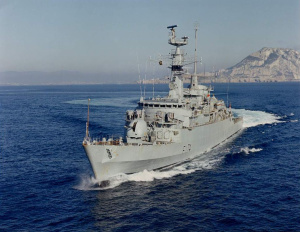HMS Alacrity (F174)
This article needs additional citations for verification. (June 2008) |

| |
| History | |
|---|---|
| Name | HMS Alacrity |
| Operator | Royal Navy |
| Builder | Yarrow Shipbuilders |
| Commissioned | 2 July 1977 |
| Decommissioned | 1 March 1994 |
| Identification | Pennant number: F174 |
| Motto |
|
| Fate | Sold to Pakistan on 1 March 1994 |
| Name | PNS Badr |
| Operator | Pakistan Navy |
| Commissioned | 1 March 1994 |
| Decommissioned | April 2013 |
| Status | Decommissioned |
| General characteristics | |
| Class and type | Type 21 frigate |
| Displacement | 3,250 tons full load |
| Length | 384 ft (117 m) |
| Beam | 41 ft 9 in (12.73 m) |
| Draught | 19 ft 6 in (5.94 m) |
| Propulsion |
|
| Speed | 32 knots (59 km/h; 37 mph) |
| Range |
|
| Complement | 177 |
| Armament |
|
| Aircraft carried | 1 × Westland Wasp helicopter, later refitted for 1 × Lynx |
HMS Alacrity was a Type 21 frigate of the Royal Navy.
Alacrity was active during the Falklands War of 1982, where she sunk a supply ship, survived four Exocet-missile attacks and rescued men from the Atlantic Conveyor.
Background
Built by Yarrow Shipbuilders Ltd, Glasgow, Scotland, she was completed with Exocet launchers in 'B' position.
1977-1981
In 1977, Alacrity took part in the Fleet Review, of the Royal Navy at Spithead in celebration of HM the Queen's Silver Jubilee.[1]
Falklands War
Alacrity participated in the Falklands War, departing Devonport on 5 April 1982, captained by Commander Christopher Craig.
The most notable incident involving Alacrity was the sinking of the 3000 ton Argentine supply ship ARA Isla de los Estados by gunfire over the night of 10–11 May 1982, near Swan Islands. At the time, Alacrity was on a mission to establish whether or not the Argentines had mined the north entrance to Falkland Sound.[2] Alacrity was slightly damaged by splinters from an Argentine bomb on 1 May.[citation needed]
As Alacrity left the Falkland Sound on 11 May, the Argentine submarine, San Luis was reported to have fired two torpedoes at Alacrity and her sister ship Arrow. Both missed, and the ships rejoined the task force.[citation needed]
On 25 May, Alacrity sustained her only damage, a bump to her bow, while rescuing survivors of SS Atlantic Conveyor which had been struck with Exocet missiles.[3]
Alacrity survived about ten air attacks, including four Exocet missiles and two bombs that all missed.[3]
1982-1994
As with the other surviving Type 21 frigates, Alacrity was suffering from cracking in her hull by the mid-1980s. She was taken in for refitting, and a steel plate was welded down each side of the ship. At the same time modifications were made to reduce hull noise.[citation needed]
In 1989 whilst deployed as West Indies Guard Ship "Alacrity" was tasked for humanitarian relief on the island of Montserrat in the British West Indies after the island suffered devastation in the wake of hurricane "Hugo". The ship's Lynx helicopter being the sole means of transporting aid ashore as the port was destroyed.[citation needed]
Alacrity was decommissioned and transferred to Pakistan on 1 March 1994, being renamed Badr. Exocet was not transferred to Pakistan and Badr had her obsolete Sea Cat launcher removed. Signaal DA08 air search radar replaced the Type 992 and SRBOC chaff launchers and 20 mm and 30 mm guns were fitted.[citation needed]
Between 11–21 May 2008, Badr participated in Exercise Inspired Union, a multi-national exercises in the North Arabian Sea. Other Pakistani warships included the frigate Shah Jahan and the replenishment tanker Nasr, as well as the Pakistan Air Force explosive ordnance disposal team, and the American destroyers Curts and Ross.[4]
Badr was decommissioned in April 2013 by the Pakistan Navy.[citation needed]
Commanding officers
| From | To | Captain |
|---|---|---|
| 1976 | 1978 | Commander R B Mortlock RN |
| 1978 | 1979 | Commander A J Bannister RN |
| 1980 | 1982 | Commander C J S Craig DSC RN |
| 1982 | 1983 | Commander B B Perowne RN |
| 1983 | 1985 | Commander M A Johnson RN |
| 1985 | 1986 | Commander J H S McAnally RN |
| 1987 | 1989 | Commander R P Barton RN |
| 1989 | 1990 | Commander C D Ferbrache RN |
| 1990 | 1992 | Commander A R C Bennett DSC RN |
| 1992 | 1994 | Commander A Croke RN |
References
- ^ Official Souvenir Programme, 1977. Silver Jubilee Fleet Review, HMSO
- ^ One Hundred Days, Admiral Sandy Woodward, Pages 280 and 281. ISBN 978-0-00-713467-0
- ^ Lt. (j.g.) Bryan Boggs, USN (6 June 2008). "USS Curts, Pakistani Navy Participate in Officer Exchange Program". NNS080602-12. Abraham Lincoln Carrier Strike Group Public Affairs. Retrieved 27 December 2010.
{{cite web}}: Italic or bold markup not allowed in:|publisher=(help)
Publications
Colledge, J. J.; Warlow, Ben (2006) [1969]. Ships of the Royal Navy: The Complete Record of all Fighting Ships of the Royal Navy (Rev. ed.). London: Chatham Publishing. ISBN 978-1-86176-281-8.
